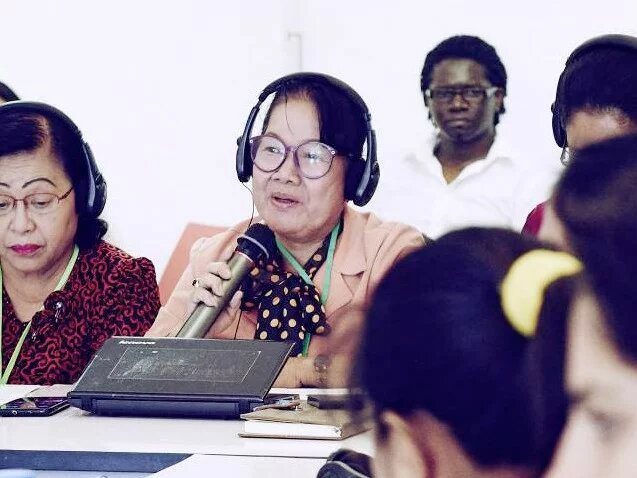
First of all, I would like to thank Heinrich Böll Foundation for organizing this roundtable on looking back to 1995 and ways forward to Beijing+20.
I’m Sochivanny Hoy, President of Positive Change for Cambodia (PCC), a feminist and women‘s rights organization seeking women’s and girls‘ full equality with men and boys. Women should live with value, freedom and peace through the implementation of CEDAW
and the Beijing Platform For Action. We should change the attitude of men and boys so that women and girls can exercise their social, economic, cultural and political rights.
From 1993 onwards, I was working with the Cambodian Women for Development Agency (CWDA). In 1995 I participated in Beijing with 85 other Cambodian women from civil society, and 35 individuals from the Cambodian government, all of whom, however, were men and barely spoke any English. During Beijing, CWDA conducted two workshops: women at the borders and women at the frontlines. In Cambodia we conducted a workshop on women and health, women in decision making, women in education, and women in community development. At the Beijing Conference, Cambodians learnt from the participants of 185 countries that young women from other countries are brave, they are strong and speaking out. This was very different to Cambodia, where women were shy, and spoke barely any English.
After Beijing I was involved with establishing, and chaired an NGO network which fought to end violence against women and lobbied the government to formulate a new law on domestic violence. In 2005 this law was finally adopted. Currently, I work with PCC and am the chair of NGO CEDAW, a network of 62 NGOs promoting the rights enshrined in CEDAW and the 12 critical areas of the BPFA. We also write shadow reports for the periodic review process and train the government on the rights enshrined in CEDAW. The government is often unaware of these rights, despite having ratified the treaty.
20 years after Beijing and the many activities conducted by civil society in advancing women’s and girls‘ rights, I can say that I see vast changes since 1995. Women and girls today are progressive as they know about their rights as women. This comes after having kept silent for 20 to 30 years, and having lived in violence with no freedom and no power and a strong economic dependency on their husbands. In the last ten years change has been rapid. Girls have gone from being silenced to talking out in public, and they earn their own livelihood in garment factories. Some even own farms or factories. However, 20 years after Beijing we still struggle with six out of the 12 critical areas. Firstly, there remains direct and indirect discrimination in laws related to violence against women and girls such as domestic violence, trafficking, marriage laws in cases of sexual harassment and sexual violence, and migration. Dominant cultural stereotypes also continue
to cause discrimination against women and girls.
Secondly, with girls and education, I see that they stop their education early to work in garment factories. Furthermore, if they cannot find decent work in Cambodia, they migrate to other countries where they are often vulnerable to exploitation. Forced marriages are also a big issue as some 15 and 16 year old girls are forced to marry foreign men from Taiwan, Korea and China in order to gain income for their family.
The third area regards the legal justice services in place for women and girls. When injustices are committed within families, women are unable to seek help from the legal system, as the common view is that violations occurring within the family should be dealt with internally. Furthermore, the corruption of commune police officers and other responsible authorities means that many women continue to experience violence.
The fourth area is that of reproductive health for women and girls. Many women and young girls are not well informed about safe sex practices.
Fifthly, very few women participate in local and national decision-making processes as society still discriminates against women in this area. In 1993 6% of the members of the National Assembly were female, by 2013 the number increased to 16%.
Lastly, women are not protected from disaster and risks associated with climate change. High level government officials in Cambodia are unaware of the differential impact that issues related to climate change can have on women and girls. In fact, women’s and girls‘ livelihoods can be dramatically impacted by the changing climate.
As some promises of Beijing have not been fulfilled until this day, I would like to send out a message to all women of the world. Donors and funding NGOs should support and fund NGOs working on women‘s rights in Cambodia, especially in the six areas listed above. Moreover, women activists should expand their network with other NGOs promoting gender equality. Older women must help build the capacities of girls, and prepare them to be strong women in future, aware of their rights. Societies of all regions should share their knowledge and support each other in advancing the rights of women.
After 20 years of working hard to improve the lives of women in Cambodia, there has been a significant amount of achievement. Women have broken their shyness and silence, and are letting their voices be heard. Compared to 1995, more girls can be found in both primary
and secondary education, and women have even entered into technical studies and foreign languages. Cambodia has also ratified most conventions, and there are laws in place to protect women. Some cultural stereotypes causing discrimination against women have eroded, and compared to the stereotype of Cambodian women before 1995 and before the Pol Pot Regime, one must say we have come a long way.
This article first appeared in "We have come a long way...but there is still a long road ahead". Voices from Cambodia 20 years after the Beijing Conference (1995), published by Heinrich Böll Stiftung Cambodia.



